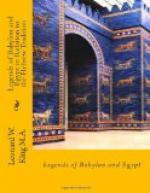(1) For detailed lists of the points of agreement presented by the Hebrew Versions J and P to the account in the Gilgamesh Epic, see Skinner, op. cit., p. 177 f.; Driver, Genesis, p. 106 f.; and Gordon, Early Traditions of Genesis (1907), pp. 38 ff.
Thus, viewed from a purely literary standpoint, we are now enabled to trace back to a primitive age the ancestry of the traditions, which, under a very different aspect, eventually found their way into Hebrew literature. And in the process we may note the changes they underwent as they passed from one race to another. The result of such literary analysis and comparison, so far from discrediting the narratives in Genesis, throws into still stronger relief the moral grandeur of the Hebrew text.
We come then to the question, at what periods and by what process did the Hebrews become acquainted with Babylonian ideas? The tendency of the purely literary school of critics has been to explain the process by the direct use of Babylonian documents wholly within exilic times. If the Creation and Deluge narratives stood alone, a case might perhaps be made out for confining Babylonian influence to this late period. It is true that during the Captivity the Jews were directly exposed to such influence. They had the life and civilization of their captors immediately before their eyes, and it would have been only natural for the more learned among the Hebrew scribes and priests to interest themselves in the ancient literature of their new home. And any previous familiarity with the myths of Babylonia would undoubtedly have been increased by actual residence in the country. We may perhaps see a result of such acquaintance with Babylonian literature, after Jehoiachin’s deportation, in an interesting literary parallel that has been pointed out between Ezek. xiv. 12-20 and a speech in the Babylonian account of the Deluge in the Gilgamesh Epic, XI, ii. 180-194.(1) The passage in Ezekiel occurs within chaps. i-xxiv, which correspond to the prophet’s first period and consist in the main of his utterances in exile before the fall of Jerusalem. It forms, in fact, the




